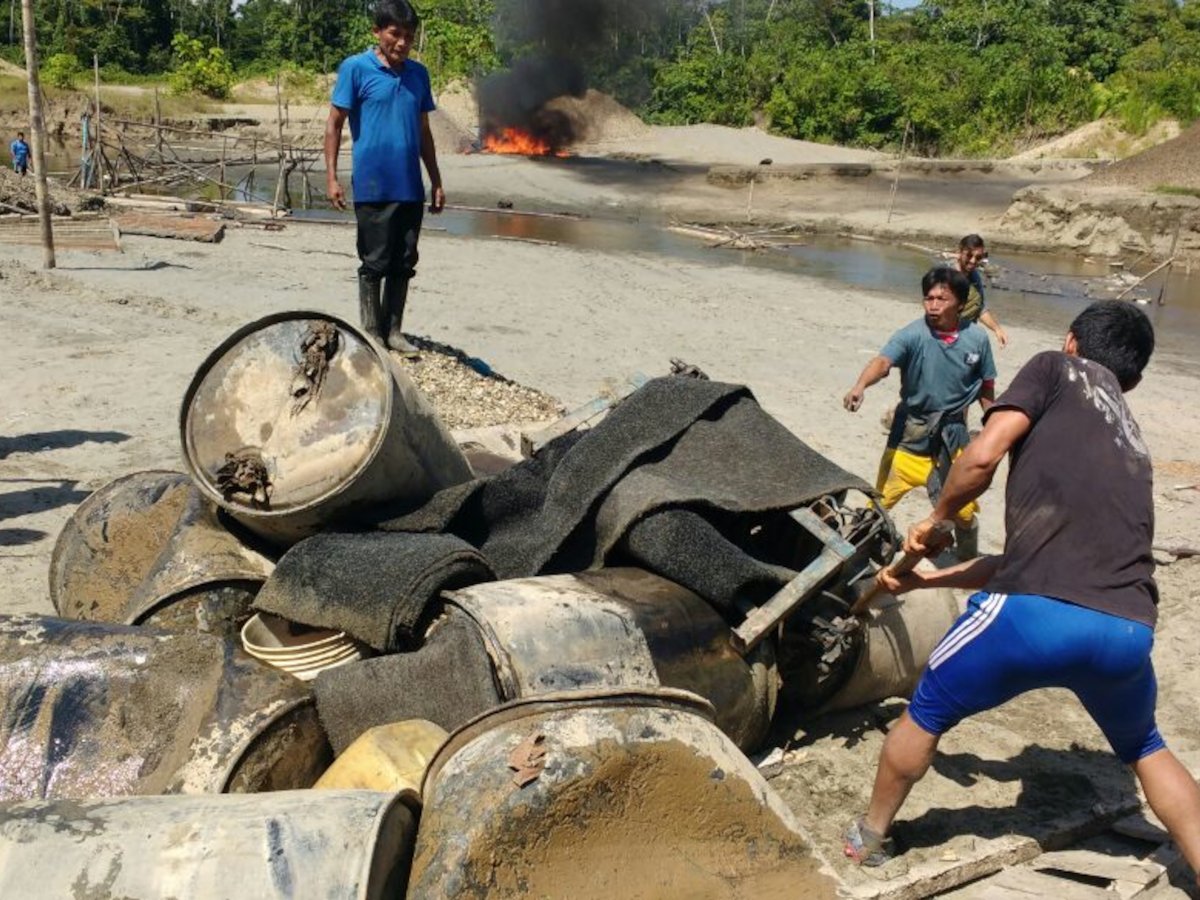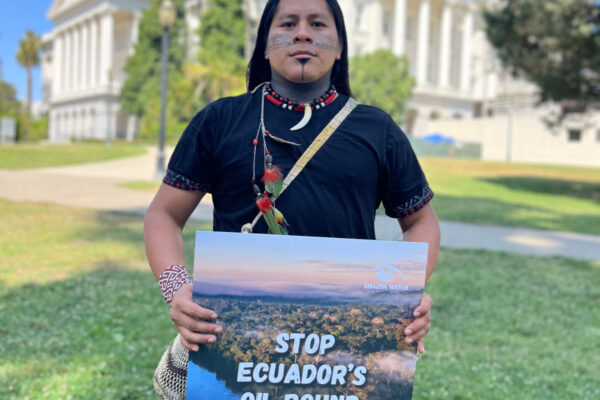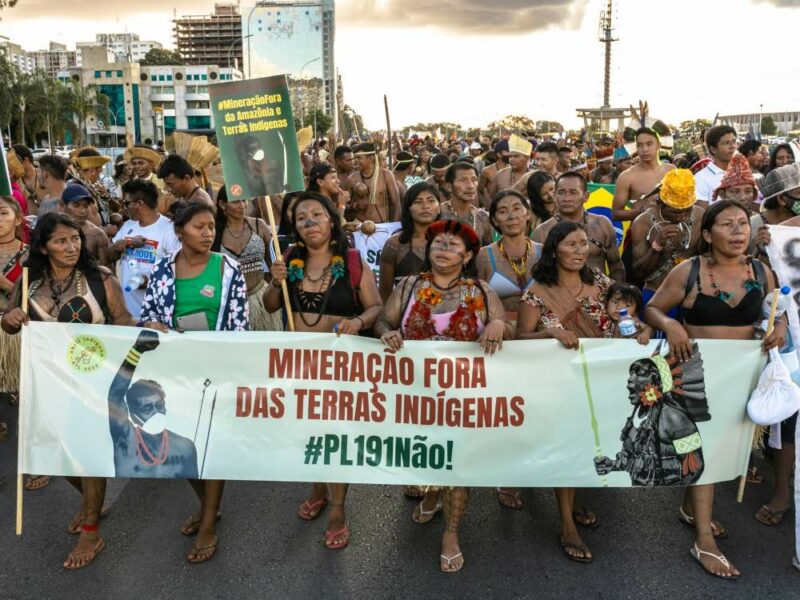Although organized crime has been present in the region for many years, it has recently become a major threat to the Amazon and Indigenous rights and territories. Our new report, Amazon Underworld (based on the work of the Amazon Underworld research journalism project and developed together with the Global Initiative Against Transnational Organized Crime), presents a shocking analysis of the impacts of illicit economies and a series of recommendations on how to respond.
Amazon Underworld shows how Indigenous territorial control and governance have proven to be a bulwark against illegal economies, but leaders and communities are facing threats and violence from organized crime. At the same time, governmental approaches concentrate almost exclusively on repression and militarization. Supporting Indigenous rights, economies, and territorial control have proven to be much more effective and should be central to any local and national governmental policies, as well as viable approaches for international cooperation and institutions.
The Amazon has become one of the main sources and transit hubs for criminal economies in Latin America. From shipments of cocaine, gold, and timber floating down its hundreds of rivers, to the makeshift airstrips that facilitate the nightly movement of small planes full of contraband, the Amazon is now home to a complex underground economy that fuels violence and deforestation. The unchecked actions of increasingly powerful criminal organizations pose an existential threat to the planet’s most biodiverse region and the communities it shelters.
As demand for illicit goods, particularly cocaine, has risen to historically high levels and the price of gold has increased dramatically since the early 2000s, so have criminal opportunities. This, combined with an absence of government authority, high levels of corruption, decades of faltering public policies, and a lack of coordination among countries, has created the perfect environment for some of Latin America’s most prolific criminal groups to reorganize and take over. The global pandemic in 2020 allowed crime to expand further as governments shifted their focus and spending to fighting COVID-19.
Impacts of organized crime and resistances
The Amazon Underworld report shows how criminal organizations and armed groups have expanded their presence, increased their political control, and diversified their economies in the Amazon with disastrous impacts on Indigenous peoples. Coca production, wildcat gold mining, and illegal logging are some of the principal drivers of deforestation and a primary source of contamination and environmental degradation in some of the most pristine parts of the Amazon. Ecosystems upon which Indigenous communities depend to sustain themselves are being destroyed, and communities themselves are often divided and their children recruited into illicit activities. The phenomena of illegality can advance very rapidly, placing Indigenous peoples in a situation of great vulnerability and constant risk, eventually leading to the decomposition of local communities.
At the same time, many Indigenous peoples and communities are defending their territories and livelihoods throughout the Amazon. In Peru, the Wampis peoples organize to safeguard their territories and expel gold miners. In Ecuador, the Indigenous Federation of the Napo mobilizes their peoples and pressures the government to act against illegal mining. Meanwhile in Brazil, the Munduruku, Yanomami, and Kayapó have formed a historic alliance to resist garimpo (small-scale illegal mining) activities in their territories. In the face of the invasion of coca crops, the Kakataibo and Shipibo-Konibo peoples in Peru have organized Indigenous guards to protect their territories. The price Indigenous organizations and leaders pay, however, is often very high. They face threats to their lives and families and are increasingly the target of violence and even murder.
Indigenous territories are key to solving this crisis
These examples show that where Indigenous peoples have greater control of their territories, illegal economies can be controlled, or at least decreased, by the social and political structures of the communities themselves, while at the same time allowing for more flexible coordination with government authorities. Just as Indigenous peoples have proven to be a buffer against deforestation, they can be a central component in the fight against illegal activities in the Amazon if their own governance and territorial protection systems are supported.
Amazon Watch has worked together with the communities and organizations resisting the impacts of organized crime for years, supporting defenders and communities at risk with security measures, pushing for the recognition of collective land titles, making the issue visible in the media, advocating on national and international levels for policy responses, and targeting international markets for illegal economies, with a particular focus on illegal gold from Brazil.
This new report takes the lessons learned from our work with impacted communities and brings a regional look at the issue in order to advocate for effective and holistic policies that center Indigenous rights in efforts to contain organized crime. The main conclusions and recommendations were produced in collaboration with our Indigenous partners in Ecuador, Perú, Brazil, and Colombia.
The report proposes the need for “comprehensive public policies that go beyond simplistic repressive and sporadic law enforcement responses, and instead aim at transforming the structural conditions that drive criminal activities while reinforcing the capacities and collaboration between different stakeholders to contain organized crime.” Such strategies can only be successful if they center Indigenous territorial control, rights, and governance. Specific proposals include:
- Develop cross-border and cooperative security strategies: Environmental crimes don’t respect political borders. In addition to international regulations, a regional security strategy is necessary for enhanced law enforcement cooperation, environmental security, and Amazon diplomacy.
- Strengthen Indigenous land rights and control: To harness the full potential of Indigenous communities in curbing organized crime, public policies should be directed towards reinforcing the Indigenous peoples’ strategies of territorial control and governance, which can help limit organized crime from expanding further and counter current criminal operations. Rather than portraying Indigenous peoples as mere victims, it is crucial to recognize them as political agents.
- Support Indigenous economies: Indigenous and community economies, based on the life plans of each community and “standing forest economies,” which are economic activities and models that are centered around the sustainable use and preservation of forests, are needed as alternatives to illicit economies.
- Protect those who stand up against organized crime: Organized crime will only be stopped if those who stand up against its activities, either through defending their territories, reporting in the media, denouncing from within governments, or working on political responses, are supported and protected. Existing protection programs tend to have insufficient resources and lack the necessary considerations for the Amazon context.
- Address corruption and state complicity: Many government actions will yield no results unless corruption and deep-rooted state involvement with illicit economies are effectively addressed.
- Cross-border communication on the financing of environmental crime: Given the blurred boundaries between legal and illegal economies, there must be increased judicial scrutiny of those financing environmental crimes. The sharing of intelligence, capabilities, and cross-border communication among Amazon governments and law enforcement agencies is of utmost importance.
- Increase transparency of illegal markets and supply chains: Establishing barriers to prevent Amazon commodities from accessing international markets has proven to be dramatically insufficient. Instead, closing policy loopholes and increasing transparency and traceability would go a long way toward limiting the reach of illegal markets.
The Amazon Underworld research project, Amazon Watch, and the Global Initiative Against Transnational Organized Crime will launch the report in Lima, Peru on November 22, after which the participating organizations will lead a series of advocacy initiatives in Peru, Ecuador, Brazil, and the United States.














